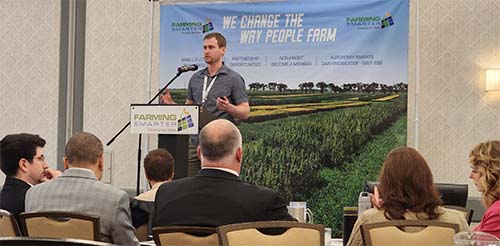Southern Alberta has a new research scientist in environmental chemistry focused on studying how agriculturally-related chemicals react and move in the environment.
The data coming from his lab will inform on-farm best management practices, potential remediation or mitigation efforts when warranted, and data-driven risk assessment and regulation.
Jonathan Challis joined AAFC Lethbridge in January 2022 and is passionate about his field of study and the benefits it can bring to the agriculture community and society as a whole.
His research focus is analytical chemistry and he studies methods to measure chemicals in the environment. In this position, that mostly relates to pesticides and other agricultural-related chemicals, including veterinary products for livestock, and cyanotoxins released by algae blooms in water and how they might impact irrigated crops. While crop nutrients aren’t his main focus they factor into much of his research.
“Ultimately, the goal is to inform evidence-based risk assessment around some of these chemicals and sustainable agriculture,” says Jonathan.
He’s actively looking for ways to connect with farmers and discover ways his research can provide on-farm benefit.
“From my perspective, I think there’s a misconception that farmers don’t care about the environment. My research in many cases confirms that there isn’t reason for concern around many agricultural-use chemicals in the environment,” he says. “However, in the cases where the data does suggest potential negative impacts, these are critical to study further to understand exactly how and why these impacts occur in order to inform sustainable use. A lot of times important data around the environmental occurrence, fate, and effects of pesticides is lacking and decisions get made based on an incomplete understanding of the actual impacts.”
|
Dr. Jonathon Challis presents his research at the 2023 Farming Smarter Conference & Trade Show |
His research provides evidence and data to risk assessors and regulators that they need to make decisions around the use and practices for agricultural chemicals. He reiterates that his research also informs farmers regarding these chemicals so that they can make good decisions.
Following a recent presentation at the February Farming Smarter conference, a couple of producers approached him to let him know they value his research. They need his data to be able to talk to the public, regulators and politicians about how differently these chemicals may behave in various regions of Canada.
“That is one of the challenges of this work in a country as geographically diverse as Canada. You can’t take one set of data from one area and assume if fits everywhere,” he says.
Jonathan talked about a discussion with the Pest Management Regulatory Agency (PMRA) about developing guidelines to improve its ability to assess the risk of a chemical based on data provided by a chemical company. He explained that the current guidelines are somewhat general and the PMRA wants more nuanced data to understand how these chemicals may act in different environmental conditions.
While his current research doesn’t require him to have landowner agreements, he wants to develop a relationship with the southern Alberta community and will gladly take calls from farmers with questions or concerns. He wants open lines of communication with the farming community because he is aware that his data can cause controversy when taken out of context.
“If there’s ever anyone that wants to talk to me directly, I’m always happy to learn more about their concerns,” he says. He wants to hear from people if they see what they think is a pesticide affect on crops or non-target organisms.
“After you spray and the pesticide has done its job, everything after that is my expertise,” he says. Basically if you see something truly odd or just curious related to a pesticide application, call Jonathan.
Jonathan says he’s heard of some interest regarding using biobeds for remediation of pesticide rinsate. He’d like to learn more about how farmers view them as a tool and what they consider a reasonable cost vs benefit for a biobed. Right now the funding for research in this area has stalled, but Jonathan would like to learn about biobed interest in the community to formulate a future project plan.
Finally, he is open to speaking at events. You can reach him at his office: 403-317-2273, or through email jonathan.challis@agr.gc.ca

